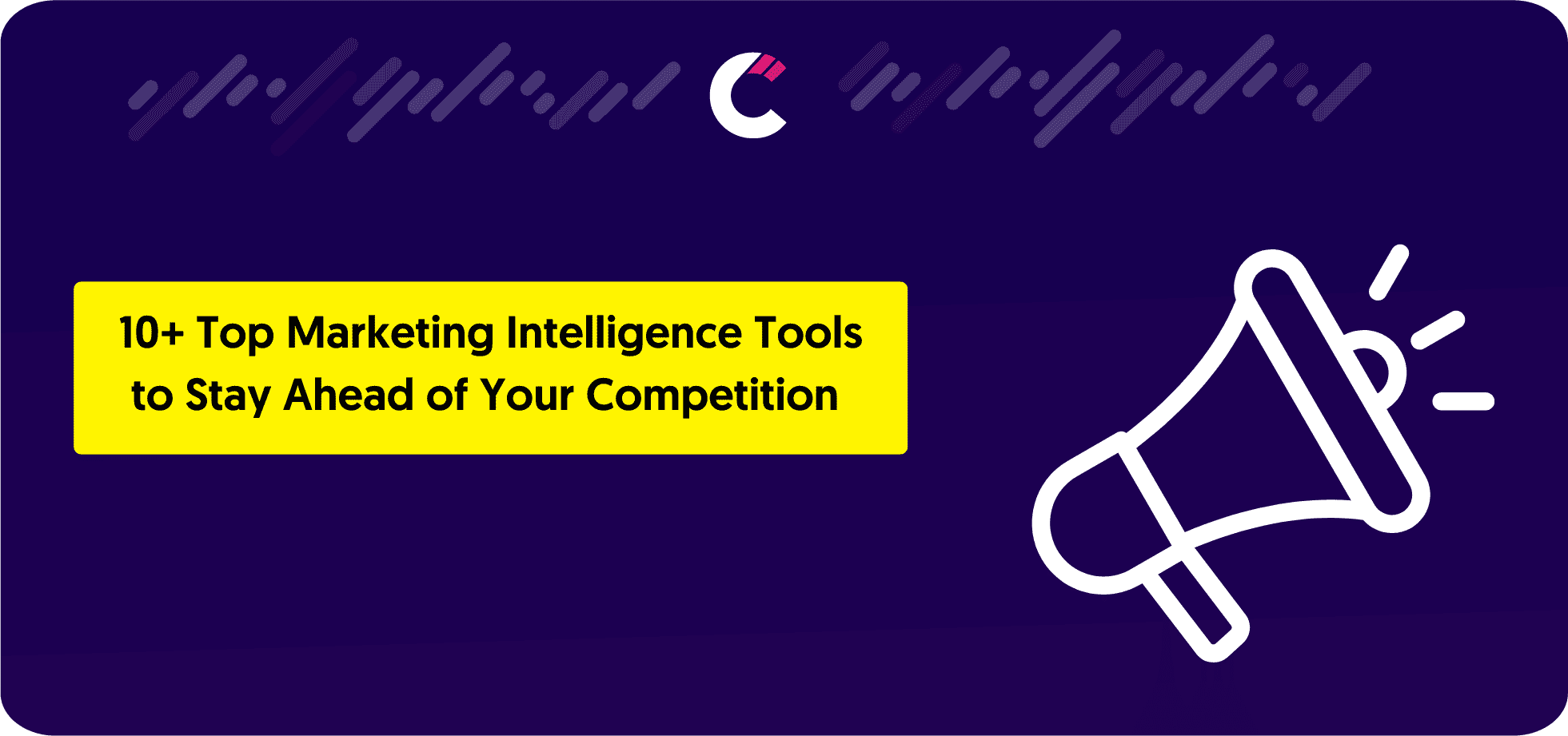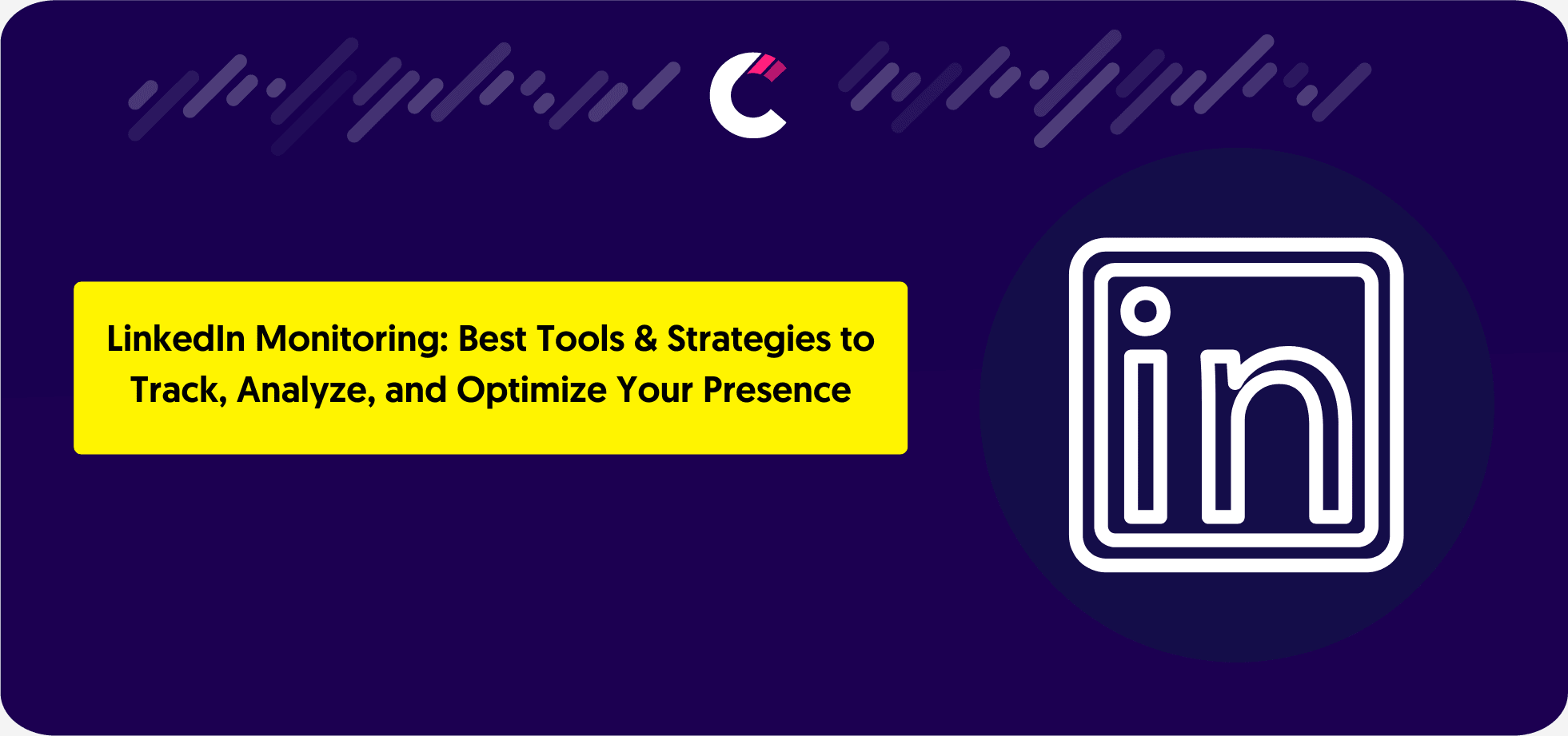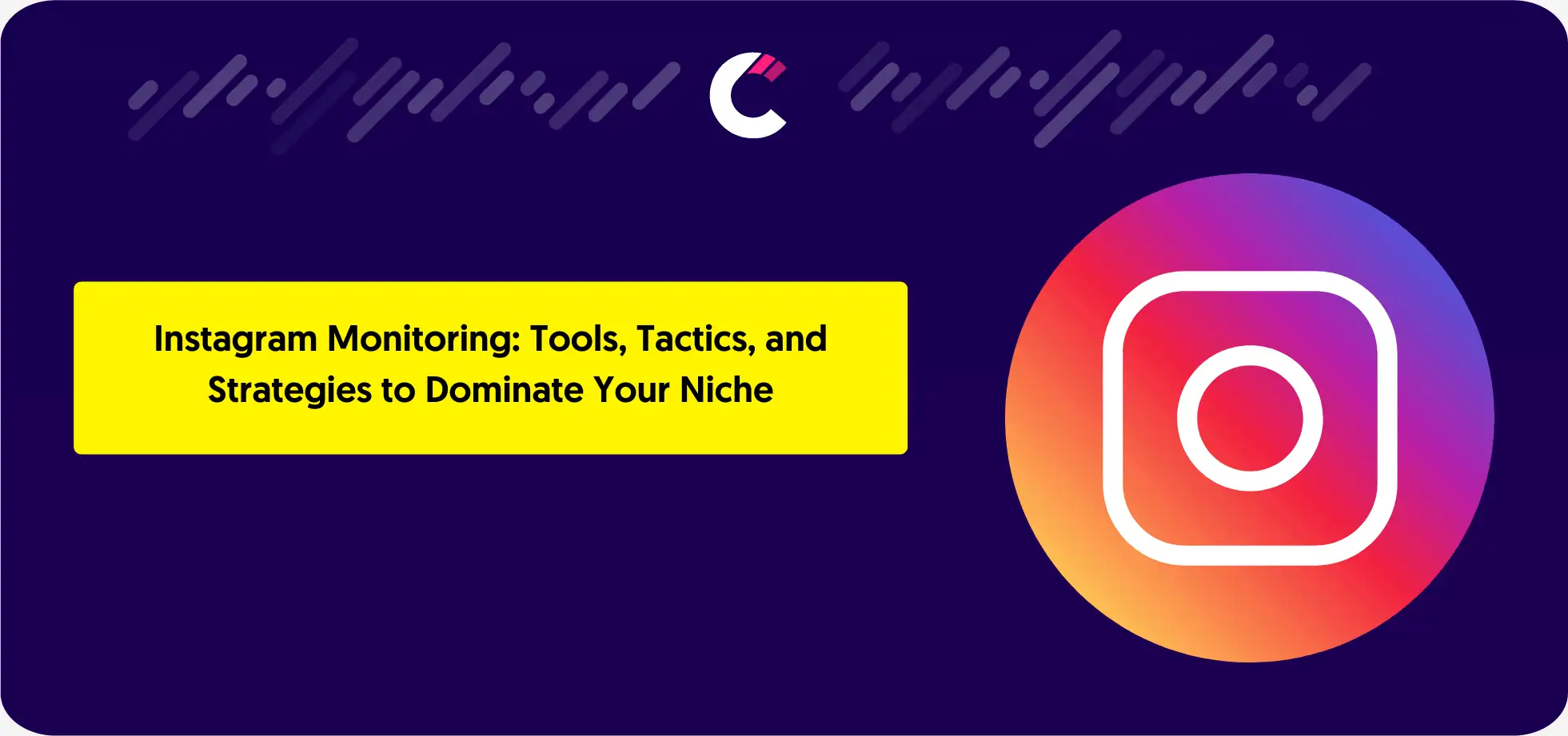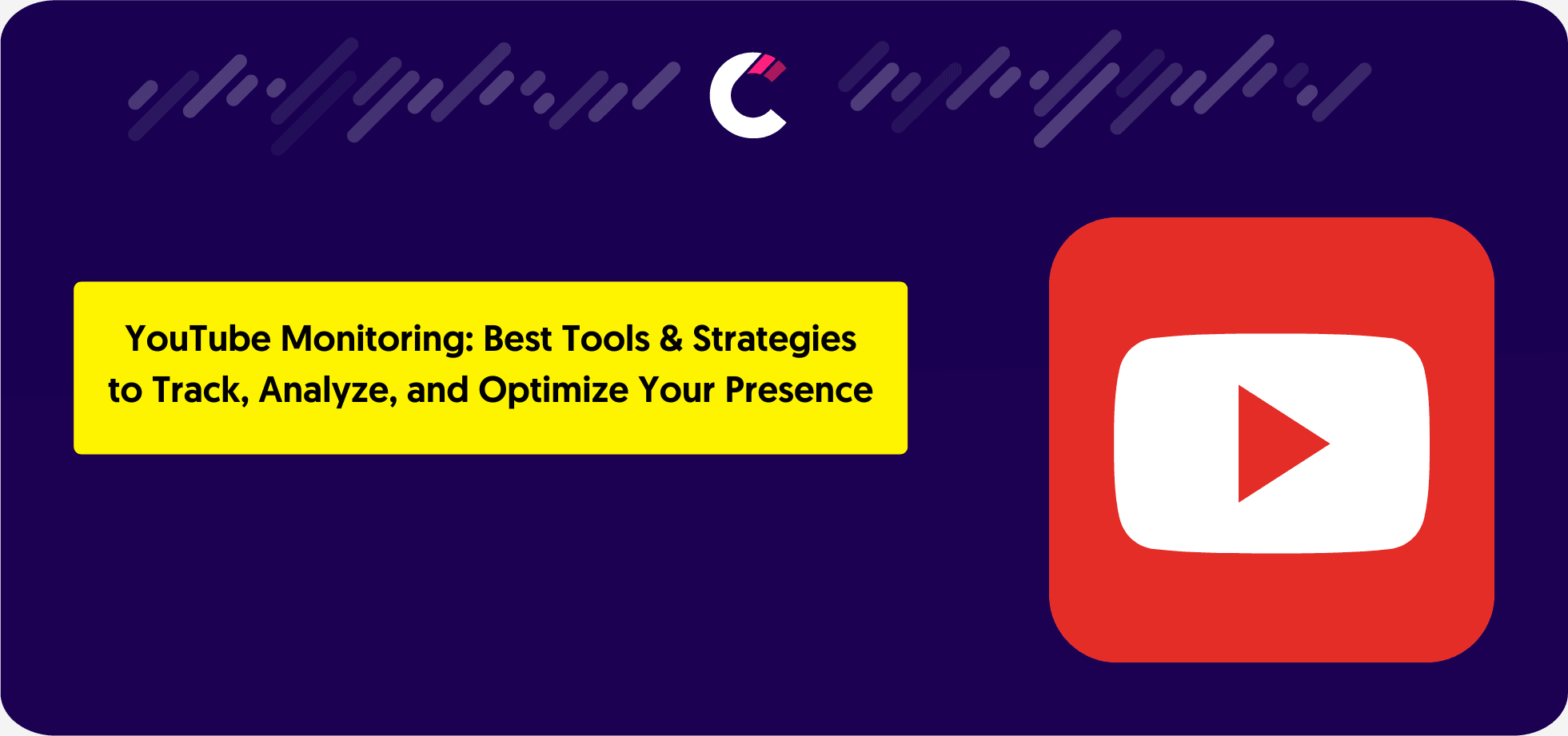What are Marketing Intelligence Tools? More Like “Why Is Karen’s Blog Outranking Me?!”
Let’s cut the corpo-BS. Marketing intel tools are like that one friend who screenshots your ex’s Insta stories and DMs you at 3 AM: “LOOK WHAT THEY’RE DOING.”
Here’s the tea:
- Data hoarding: These tools scrape the internet’s underbelly—Reddit rants, Yelp tantrums, even that 1-star review calling your product “mid AF.”
- Analysis: Turns chaos into “oh $#!%” moments. Example: “Sales dropped 420%? Because Karen’s blog said our coffee tastes like burnt socks?!”
- Strategy juice: Tells you where to throw cash. Spoiler: Not into TikTok ads for Boomers. (Unless they’re ironically into ASMR.)
🔥 The 4 Pillars of Marketing Intel (No, Not That Kind of Pillar)
1. Customer Mind-Reading (But Legally Questionable)
Tools like Hotjar show you where users rage-click. True story: Our “Buy Now” button looked “too needy.” Changed it to “Maybe Later? 🥺” Sales up 69%. Nice.
2. Competitor Voodoo Dolls
Karen’s blog ranks for “vegan SEO”? Write “Vegan SEO Tips That Won’t Make You Cry Into Your Kale.” Tools like Ahrefs let you steal her keywords. It’s not theft—it’s “competitive yoga.”
3. Trend FOMO (RIP, NFTs)
Remember when “blockchain SEO” was a thing? Yeah, Google doesn’t either. Tools like Exploding Topics sniff trends before they’re basic. Pro tip: If your niece’s TikTok is obsessed, you’re already late.
4. Product Roast Sessions
Data don’t lie. If your “artisanal firewood” gets reviews like “Great for burning my ex’s love letters,” maybe pivot. Track: – Sales dips (Did your soap taste “too clean”?) – Returns (If 90% come back, bury the product. Literally.)
Why Bother? 🤡
Without intel, you’re just screaming into the void. And the void doesn’t care. Use these tools to: – Avoid selling “SEO-certified rocks” (yes, that’s a real thing) – Stop wasting time on dead trends (*cough* Metaverse SEO) – Be the Sherlock of your niche (Deerstalker hat optional)
Top marketing intelligence tools
Marketing intelligence tools simplify data collection, analysis, and application, enabling businesses to make informed decisions and stay competitive.
Below is an overview of some of the best tools available, starting with their key features and benefits.
Tool Name | Key Features | Advantages | Disadvantages | Pricing |
– Real-time competitor monitoring – SEO & keyword analysis – Social media and content tracking | – Real-time alerts – Customizable monitoring – Affordable pricing | – Limited internal data insights – Requires initial setup | ||
ZoomInfo | – Comprehensive business database – Intent data analysis – CRM integrations | – Rich data – Advanced targeting – Enhanced sales & marketing collaboration | – High cost – Data accuracy concerns – Learning curve for new users | Starts at $15,000/year |
– SEO audits – Keyword research – Competitor analysis | – Comprehensive toolset – Reliable data – Easy-to-use dashboards | – High cost for small teams – Limited social media tools – Data overload | Pro: $139.95/month Guru: $249.95/month Business: $499.95/month | |
– Competitor website tracking – Sales battlecards – Custom alerts | – Comprehensive competitor insights – Actionable sales resources – Collaboration tools | – High cost – Limited market-wide analysis – Setup complexity | Custom pricing available upon request | |
– Website traffic analysis – Industry benchmarking – Audience insights | – Comprehensive data – Benchmarking capabilities – Customizable reports | – High cost – Inconsistent data for smaller websites – Digital focus | Starter: $125/month Pro: $333/month Team/Enterprise: Custom pricing | |
G2 Market Intelligence | – Software comparison – Market trends insights – Customer sentiment analysis | – Crowdsourced reviews – Extensive software database – Actionable insights | – Focused on software – Potential review bias – Premium features cost more | Free for basic use, custom pricing for advanced features |
Crunchbase | – Company profiles – Funding insights – Advanced search filters | – Up-to-date global database – User-friendly interface – Collaboration features | – Limited data on smaller companies – Premium features required for deep insights | Basic: Free Pro: $49/month Enterprise: Custom pricing |
– Competitor content tracking – Battlecards for sales – Collaboration tools | – Sales enablement focus – Customizable insights – Collaboration features | – Premium pricing – Limited market analysis – Initial setup time | Custom pricing available upon request | |
TrustRadius for Vendors | – Review collection & management – Content syndication – Buyer insights | – Builds credibility – Enhanced lead generation – Actionable customer feedback | – Costly for small businesses – Dependent on customer participation – Time-intensive setup | Custom pricing available upon request |
Factiva | – Global news database – Market trends analysis – Custom search tools | – Extensive data coverage – Real-time updates – Actionable industry insights | – High cost – Complex for beginners – Limited non-news data | Custom pricing available upon request |
Leadspace | – Data enrichment – Lead scoring – Audience segmentation | – AI-driven insights – Improved targeting – Scalable solutions | – Steep learning curve – Occasional data discrepancies – High cost | Custom pricing available upon request |
PitchBook | – Investor profiles – Deal tracking – Market analysis | – Reliable financial data – Actionable insights – User-friendly interface | – High cost – Limited relevance outside finance – Complex features | Custom pricing available upon request |
D&B Hoovers | – Global business database – Lead generation | – Comprehensive coverage – Actionable insights – Streamlined CRM integrations | – High cost – Complexity for new users – Delayed data updates | Custom pricing available upon request |
1. Competitors App
Overview
Competitors App is a specialized marketing intelligence tool built to track and analyze competitor activities in real-time. Its primary goal is to provide businesses with the insights they need to stay ahead in an increasingly competitive market. By offering detailed monitoring across multiple channels, this tool empowers companies to adapt their strategies swiftly, minimize blind spots, and capitalize on new opportunities as they arise.
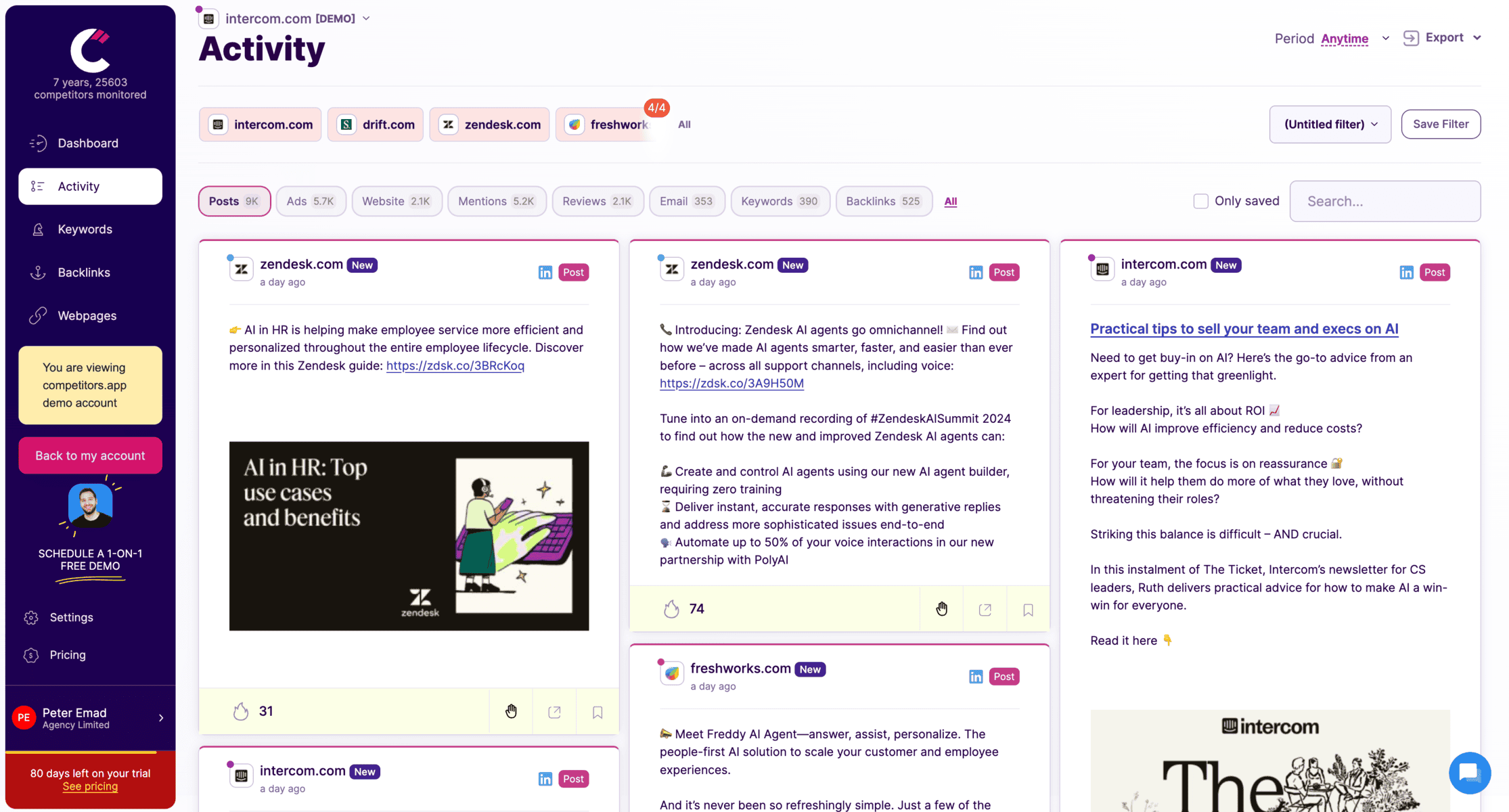
Tracks competitor social media updates across LinkedIn, Facebook, Twitter, and more.
Pricing: Starts from $19.99/mo with a free 14-day trial available.
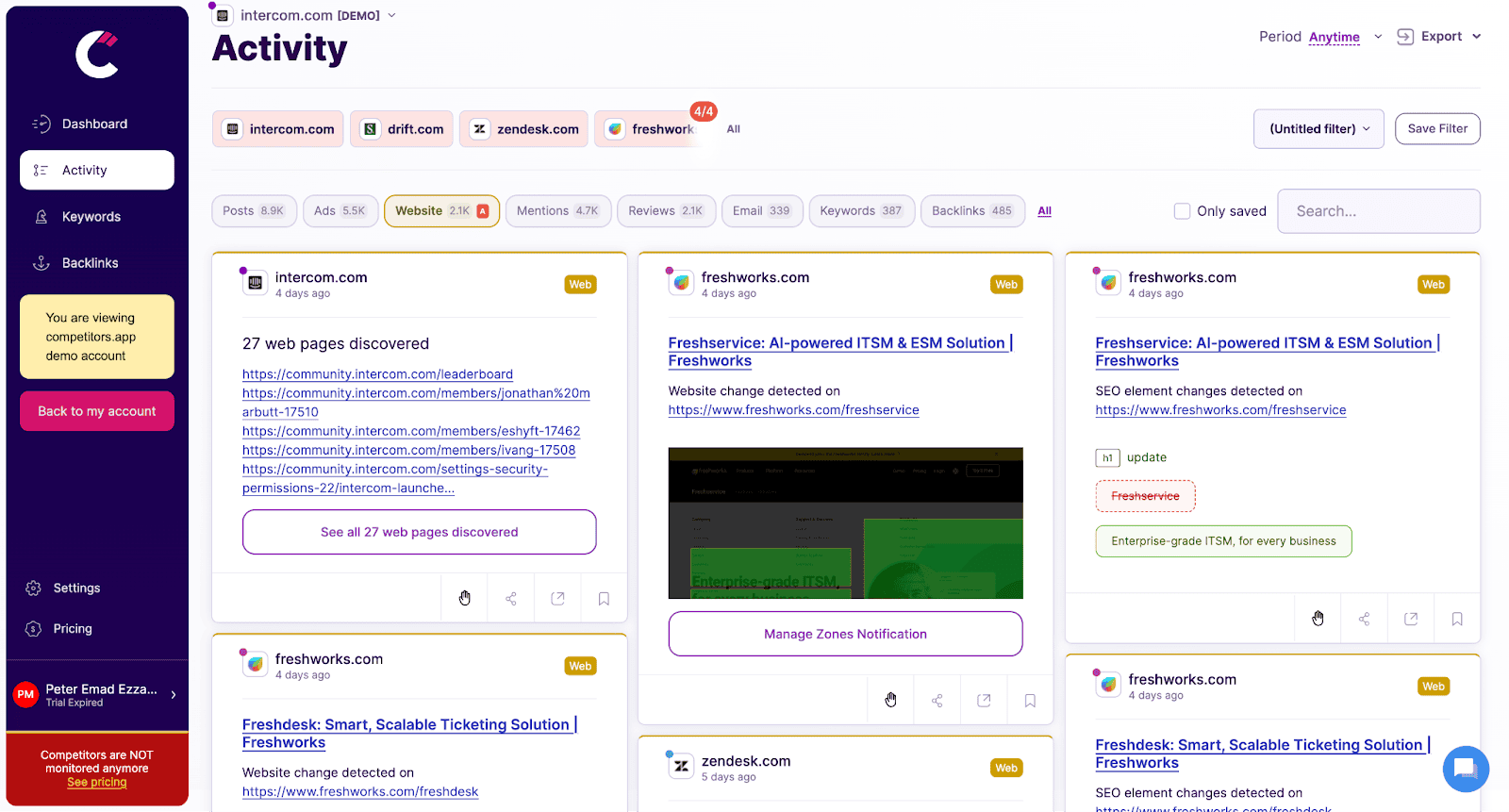
Monitors changes on competitors’ websites, such as product updates, pricing adjustments, and new messaging, providing instant alerts to help sales teams respond promptly.
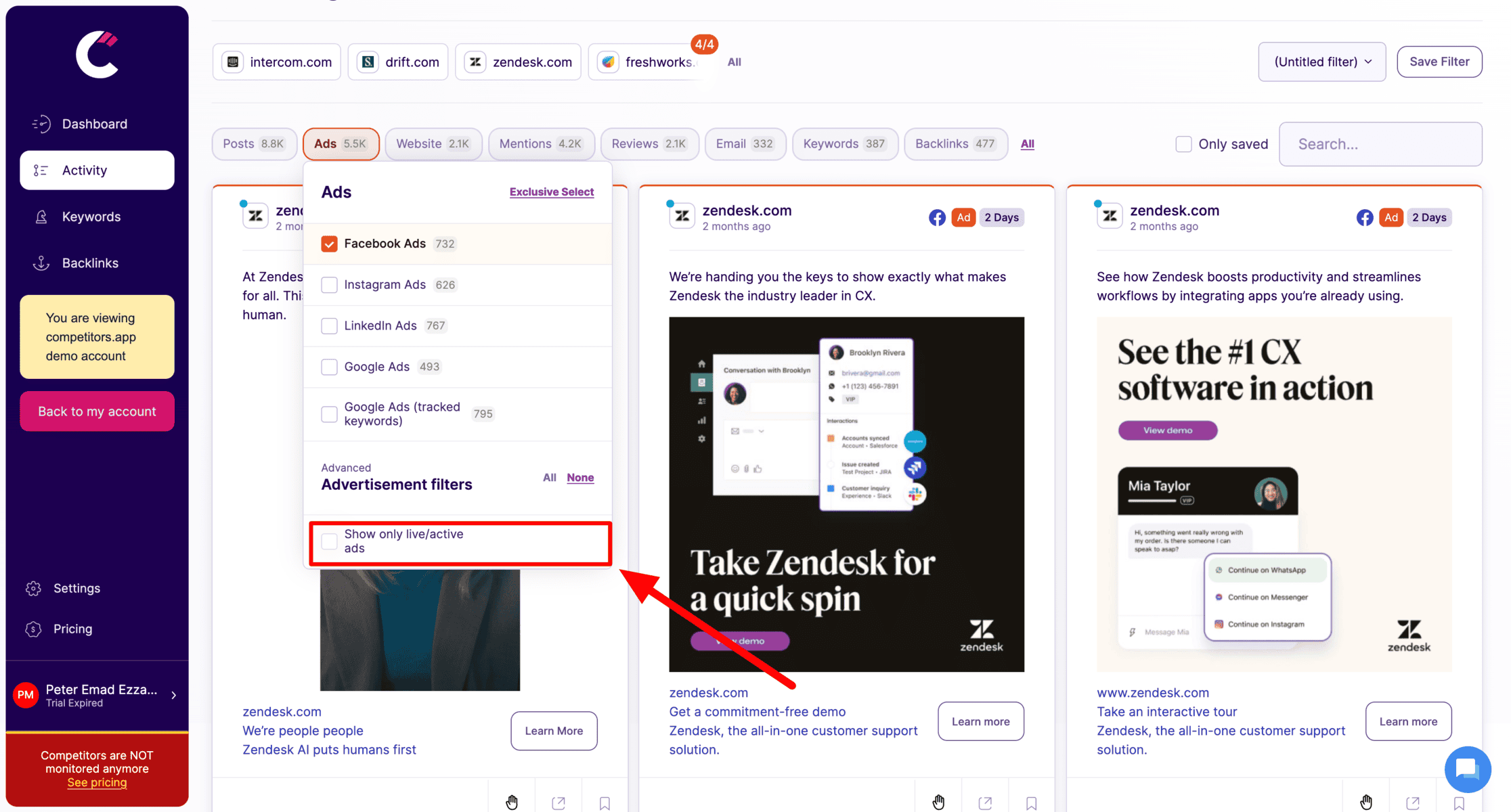
Tracks digital ad campaigns across platforms like Google Ads, Facebook, LinkedIn, and Instagram. It provides details on ad creatives, spending, and performance metrics, helping teams analyze successful ad strategies.

Analyzes competitors’ keyword strategies, organic rankings, and backlinks, allowing teams to refine their own SEO tactics and boost search visibility.
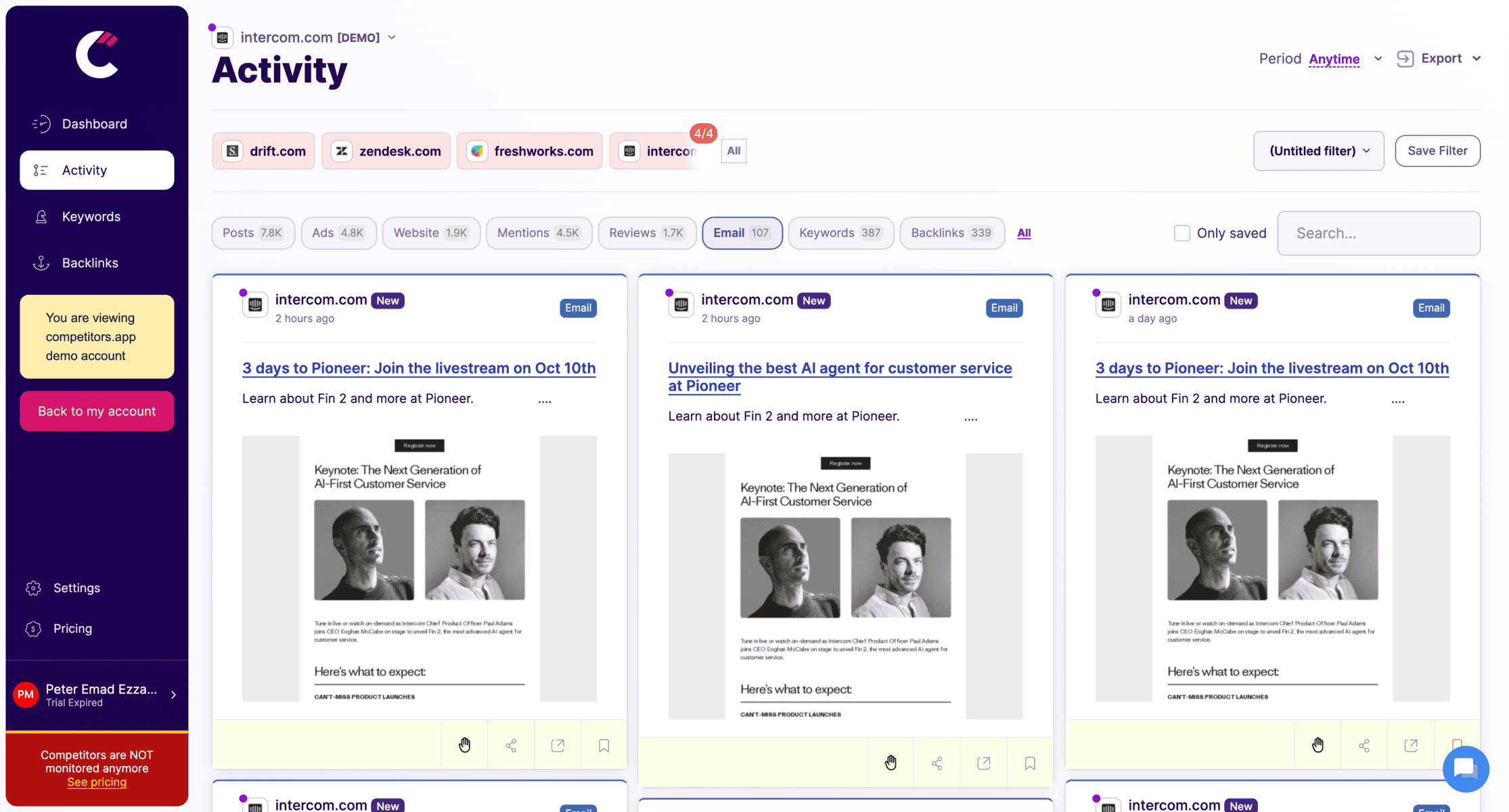
Tracks competitors’ email campaigns, including content, frequency, and engagement metrics, helping sales teams understand email tactics that drive engagement and conversions.
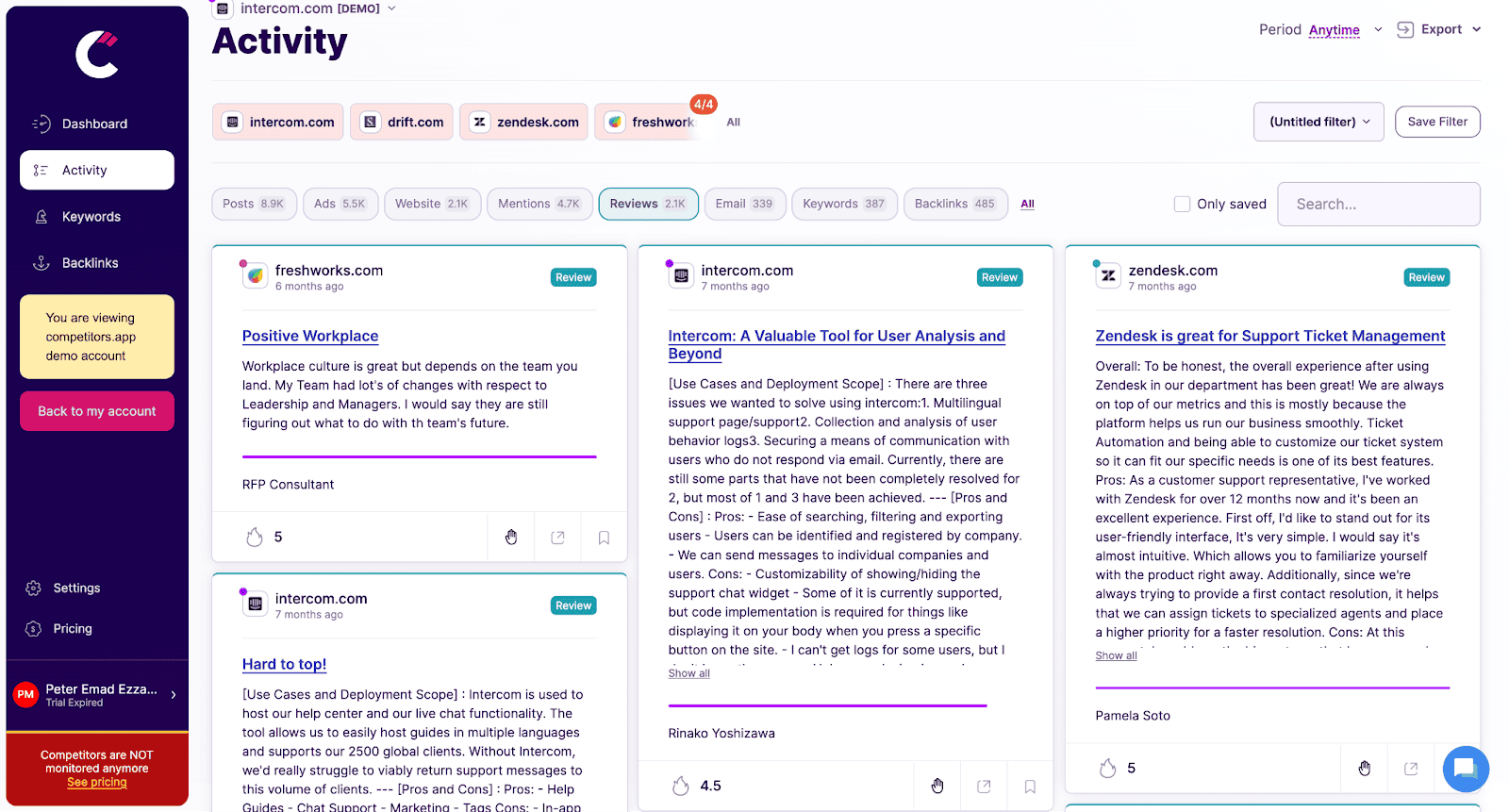
Analyzes customer reviews and ratings for competitors, providing insights into customer feedback, pain points, and product strengths, helping teams craft better sales pitches.
2. ZoomInfo
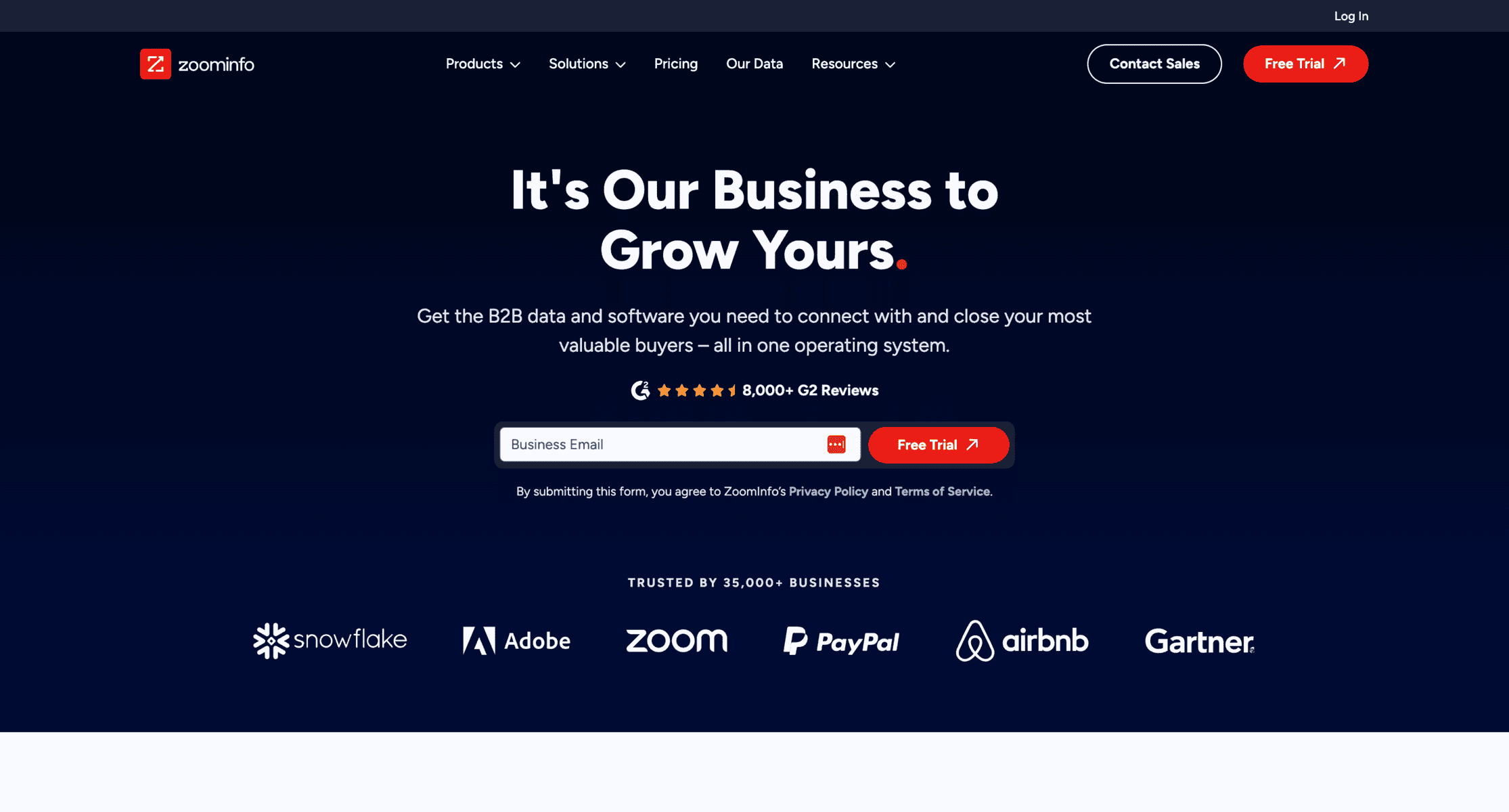
Overview
ZoomInfo is a powerful marketing intelligence tool designed for B2B businesses looking to enhance lead generation and customer targeting. Known for its extensive database of company and contact information, ZoomInfo helps organizations identify potential clients, personalize outreach efforts, and streamline sales and marketing strategies.
Key Features
- Comprehensive Business Database: Access detailed profiles of companies and key decision-makers to refine targeting.
- Advanced Search Capabilities: Filter data by industry, location, revenue, and other parameters to identify high-value prospects.
- Intent Data Analysis: Identify companies actively searching for solutions similar to yours, enabling timely outreach.
- CRM Integration: Seamlessly integrates with platforms like Salesforce, HubSpot, and other CRMs to enhance lead management.
Advantages of ZoomInfo
- Rich Data: Provides a vast, regularly updated database for precise customer insights.
- Improved Targeting: Advanced filters ensure businesses can find their ideal prospects efficiently.
- Actionable Insights: Intent data allows sales teams to engage with prospects when they are most likely to convert.
- Enhanced Collaboration: Integration capabilities make it easier for sales and marketing teams to work together.
Disadvantages of ZoomInfo
- Cost: Pricing can be high for small businesses or startups with limited budgets.
- Data Accuracy: Some users report occasional discrepancies in contact details, requiring manual verification.
- Learning Curve: The tool’s robust features may require training for new users to fully utilize.
Pricing
ZoomInfo pricing typically starts at $15,000 per year, though it varies based on the size of the business and required features. It offers tailored plans for enterprises needing more extensive data or additional capabilities.
3. SEMrush
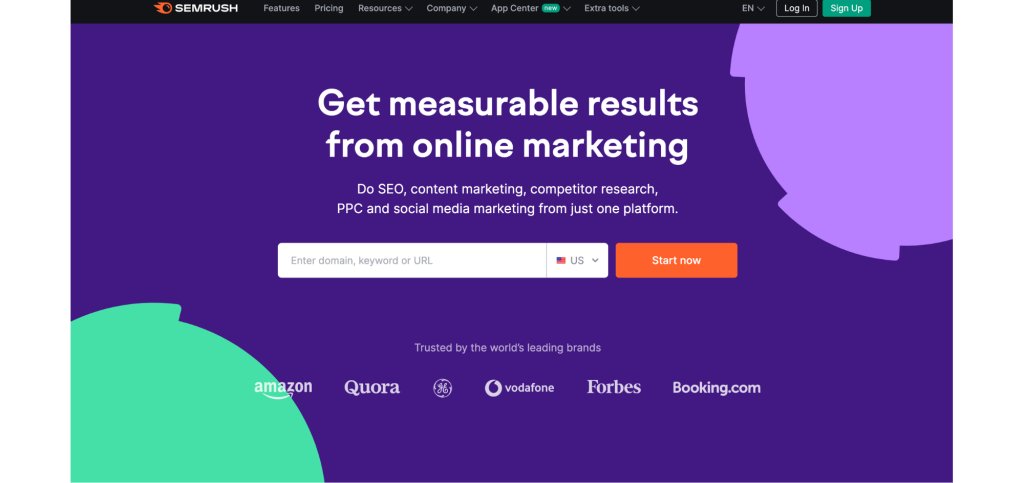
Overview
Semrush is a leading marketing intelligence tool that specializes in SEO, PPC, and content marketing. Known for its robust analytics capabilities, Semrush helps businesses improve online visibility, track competitors, and optimize their digital marketing strategies. Its extensive database and versatile features make it a favorite among marketers and digital agencies.
Key Features
- SEO Audit and Keyword Research: Provides in-depth insights into website health, keyword performance, and optimization opportunities.
- Competitor Analysis: Tracks competitors’ search rankings, backlink strategies, and ad campaigns.
- Content Marketing Toolkit: Assists in creating optimized, high-performing content with topic suggestions and performance tracking.
- PPC Advertising Insights: Analyzes pay-per-click campaigns to improve ROI and identify high-converting keywords.
Advantages
- Comprehensive Toolset: Combines SEO, content, and advertising insights in one platform.
- Data Accuracy: Offers reliable and up-to-date information on search rankings and keyword trends.
- Ease of Use: Intuitive dashboards and tools simplify complex analytics for marketers.
- Customization: Tailored reports and filters provide relevant insights for specific industries or goals.
Disadvantages
- Cost: Pricing may be steep for smaller businesses or individual users.
- Data Overload: The sheer amount of information can be overwhelming for beginners.
- Limited Social Media Features: Not as strong in social media analytics compared to other tools.
Pricing
Semrush offers three pricing tiers to accommodate various business needs:
- Pro Plan: Designed for freelancers and startups, this plan is priced at $139.95 per month.
- Guru Plan: Tailored for small to mid-sized businesses, it costs $249.95 per month.
Business Plan: Ideal for large enterprises, available at $499.95 per month.
4. Crayon
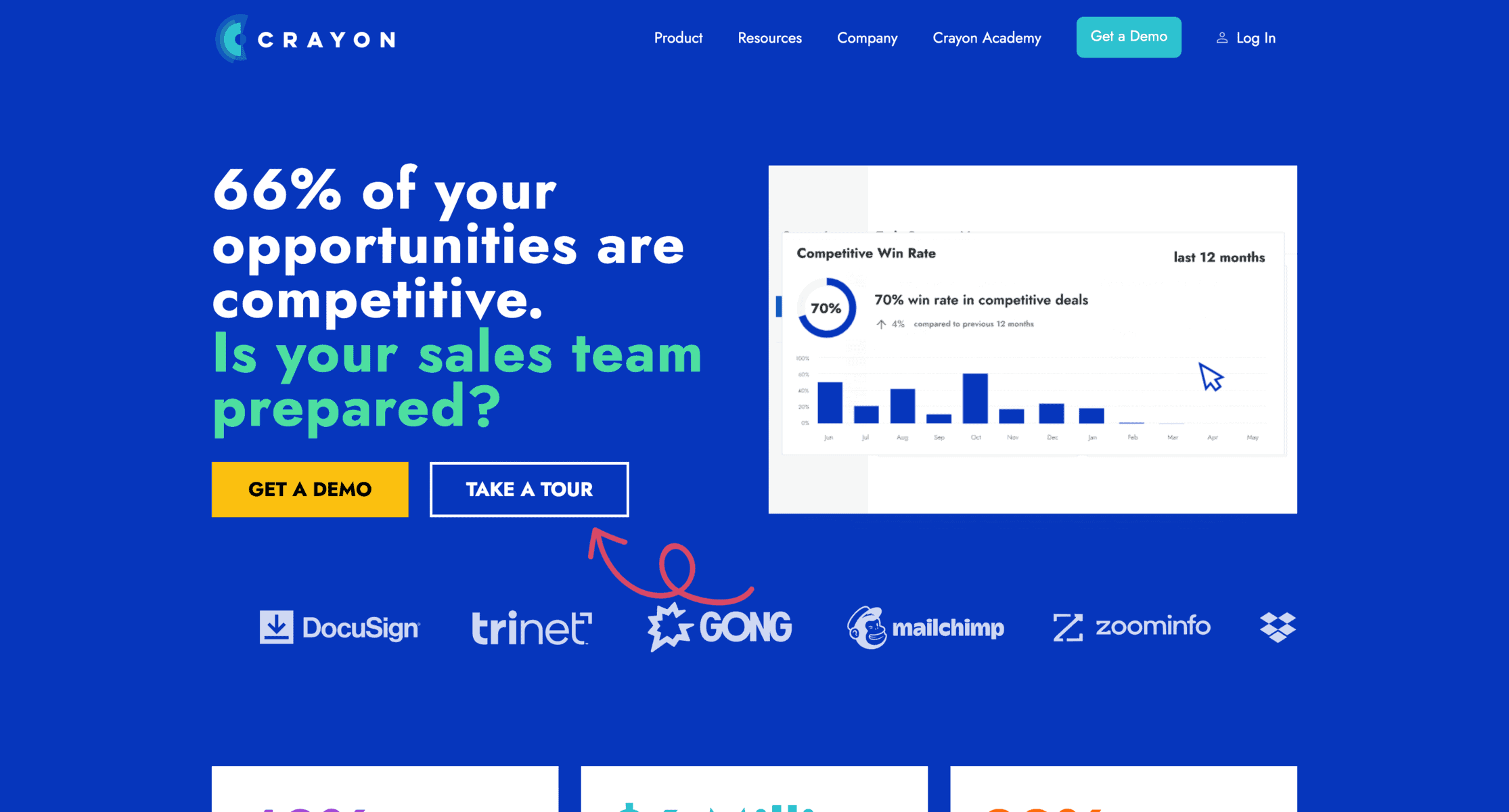
Overview
Crayon is a marketing intelligence platform specializing in competitive analysis and market insights. It allows businesses to track competitors’ moves across multiple channels, providing actionable insights to stay ahead in the industry. Crayon is particularly well-suited for organizations looking to monitor competitors’ digital footprints, from website updates to marketing campaigns.
Key Features
- Competitor Website Tracking: Detects updates and changes to competitor websites in real-time.
- Content and Messaging Analysis: Analyzes competitor messaging strategies, including email campaigns and social media posts.
- Sales Battlecards: Provides detailed guides to help sales teams effectively respond to competitors’ strategies.
- Custom Alerts: Sends notifications on relevant competitor activities to ensure timely responses.
Advantages
- Comprehensive Monitoring: Tracks a wide range of competitor activities, from website updates to social media campaigns.
- Actionable Insights: Generates sales battlecards and detailed reports for practical use by sales and marketing teams.
- Ease of Use: Offers a clean, intuitive interface for quick access to essential insights.
- Collaboration Features: Enables cross-team collaboration with shared dashboards and reporting tools.
Disadvantages
- Focus on Competitive Analysis: Primarily centered on competitor data, with fewer features for broader market intelligence.
- Price Point: Pricing can be steep for smaller businesses or startups with limited budgets.
- Setup Complexity: Requires initial customization to align with specific business needs.
Pricing
Crayon does not publicly disclose its pricing, as plans are customized based on business size and requirements. Interested users can request a demo or consult Crayon’s sales team for personalized quotes.
5. SimilarWeb
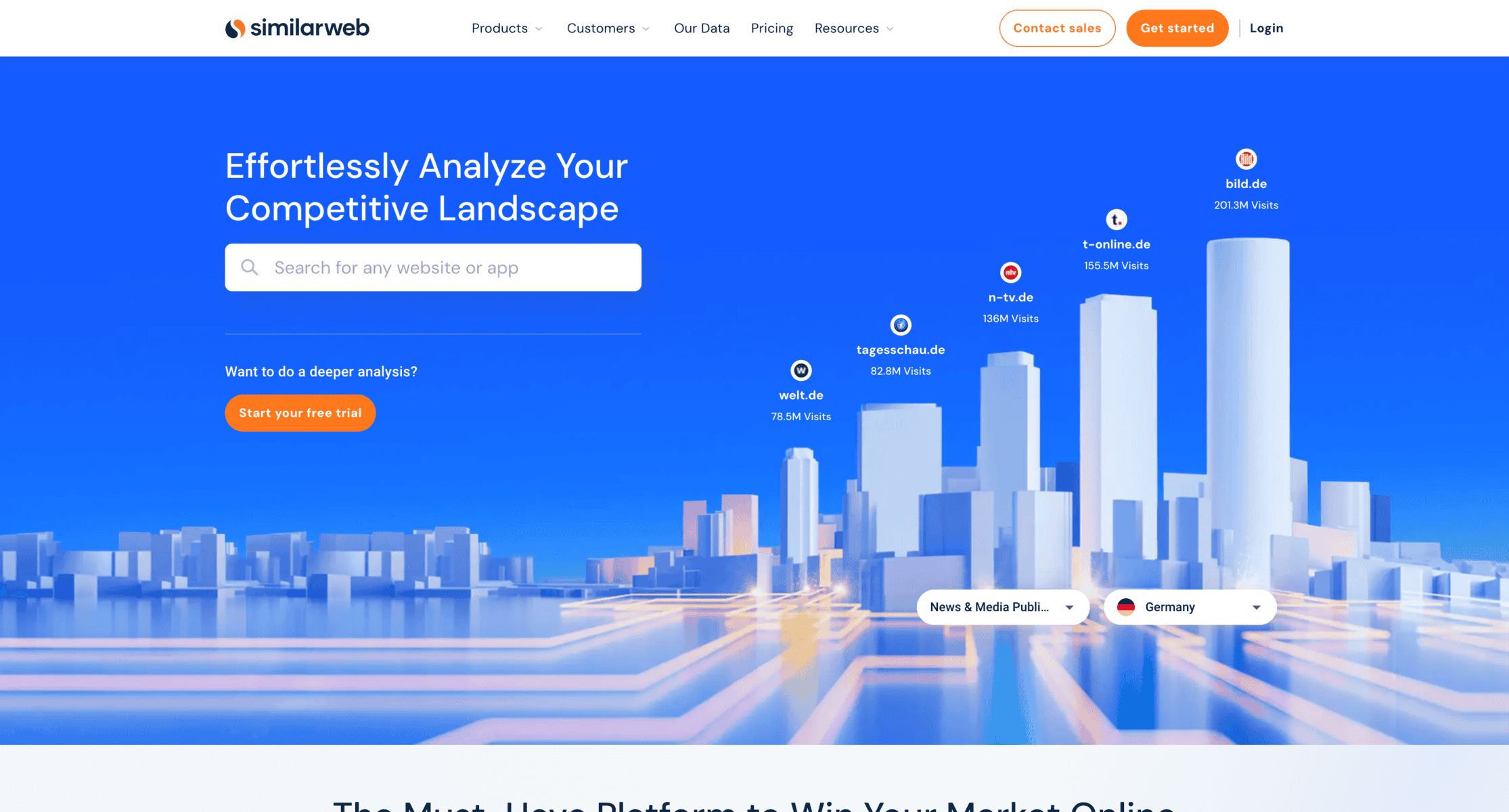
Overview
Similarweb is a marketing intelligence platform that provides comprehensive insights into website traffic, digital market trends, and competitive performance. It enables businesses to analyze online activities, benchmark against competitors, and identify growth opportunities. Companies use Similarweb to refine their digital strategies and enhance market visibility.
Key Features
- Website Traffic Analytics: Monitors traffic volume, sources, and user behavior on competitors’ websites.
- Industry Analysis: Offers insights into broader industry trends and benchmarks for performance measurement.
- Audience Segmentation: Provides data on audience demographics, interests, and behavior patterns.
- Keyword Research: Analyzes organic and paid keywords to improve search visibility and campaign effectiveness.
Advantages
- Comprehensive Data: Delivers a wide range of insights covering traffic, audience behavior, and industry trends.
- Benchmarking Capabilities: Allows real-time performance comparisons against competitors.
- User-Friendly Interface: Features intuitive dashboards for easy data access and analysis.
- Customizable Reports: Enables tailoring of reports to specific metrics and business goals.
Disadvantages
- Cost: Pricing may be high for smaller businesses, especially for advanced features.
- Data Accuracy: Some users report inconsistencies in traffic estimates for less-trafficked websites.
- Digital Focus: Primarily centers on online metrics, with limited support for offline market analysis.
Pricing
Similarweb offers several pricing plans to accommodate different business needs:
- Starter: Designed for entrepreneurs exploring website traffic analysis and competitive research, priced at $125 per month when billed annually, or $199 month-to-month.
- Professional: Aimed at professionals building marketing strategies and mapping competitive landscapes, available at $333 per month billed annually, or $449 month-to-month.
- Team: Tailored for marketing teams with a multi-channel strategy, offering custom pricing upon request.
- Enterprise: For mature organizations seeking data at scale to drive business growth, with custom pricing available upon request.
6. G2 Market Intelligence
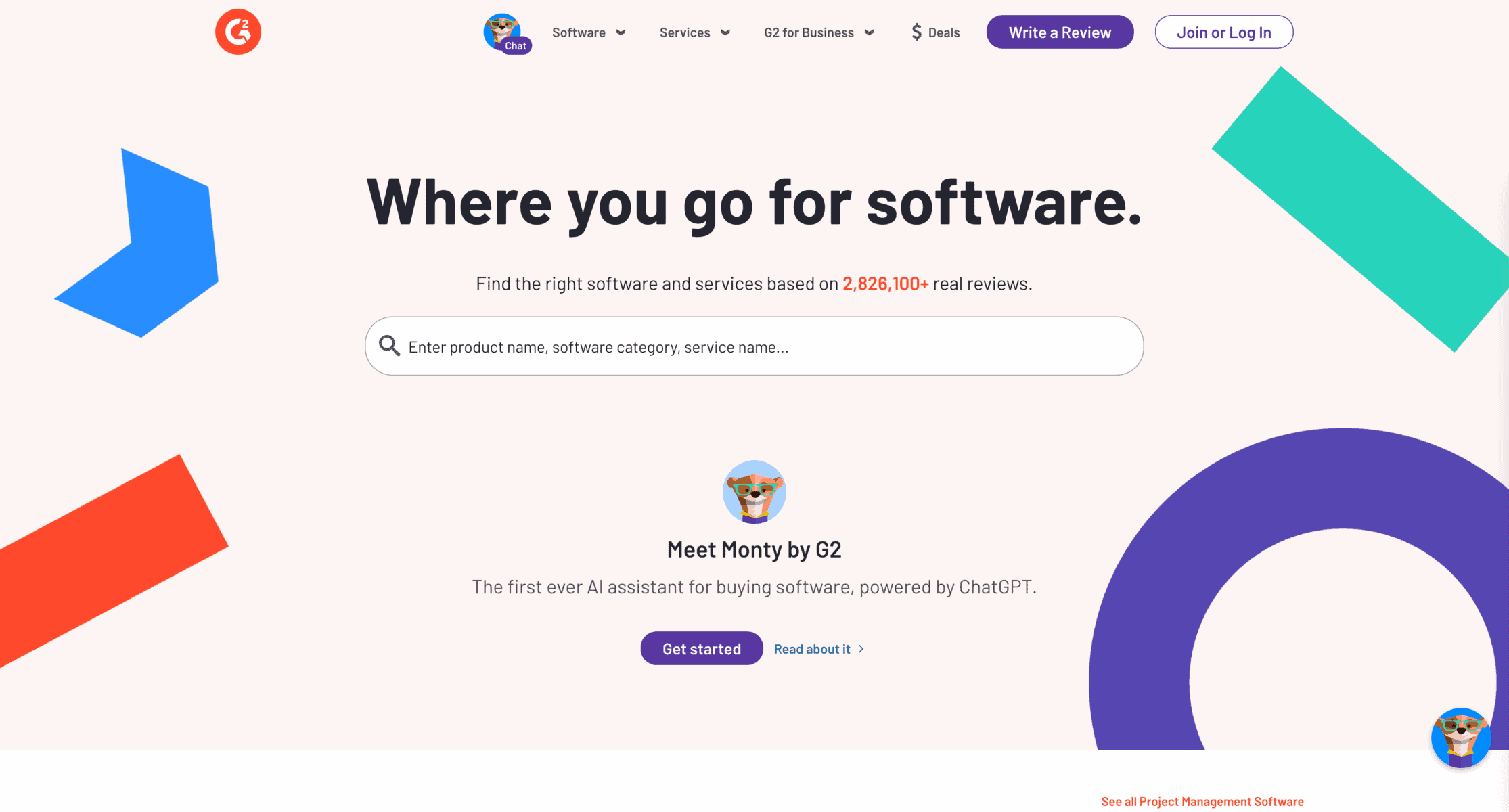
Overview
G2 Market Intelligence is a tool that provides businesses with insights into software and technology markets. Leveraging user reviews, ratings, and feedback, it helps organizations identify top-performing tools, understand market trends, and benchmark their performance. G2’s vast database of software reviews makes it particularly valuable for companies seeking reliable recommendations or competitive analysis.
Key Features
- Software Comparison Tools: Compare software solutions based on user reviews, ratings, and detailed feature analysis.
- Market Trend Insights: Analyze the latest trends in technology and software adoption across industries.
- Customer Sentiment Analysis: Understand user opinions and satisfaction with various tools and vendors.
- Competitive Intelligence: Benchmark your product’s performance against competitors using G2’s proprietary scoring system.
Advantages
- Crowdsourced Data: Relies on real user feedback, providing authentic and transparent insights.
- Extensive Database: Covers a broad range of industries and software categories.
- Actionable Insights: Combines user reviews with data-driven reports for informed decision-making.
- Vendor Support: Offers features for software vendors to manage reviews and enhance their market presence.
Disadvantages
- Focus on Software: Primarily benefits businesses in the software and tech sectors, limiting its relevance for other industries.
- Subscription Costs: Premium features and vendor tools may require a substantial investment.
- Potential Bias: Reviews may sometimes reflect individual biases or limited experiences, requiring careful interpretation.
Pricing
G2 offers free access to its database for basic research and software comparisons. For advanced features, including detailed competitive insights and vendor tools, custom pricing is provided based on the scope and scale of usage. Interested users can contact G2 for tailored solutions.
7. Crunchbase
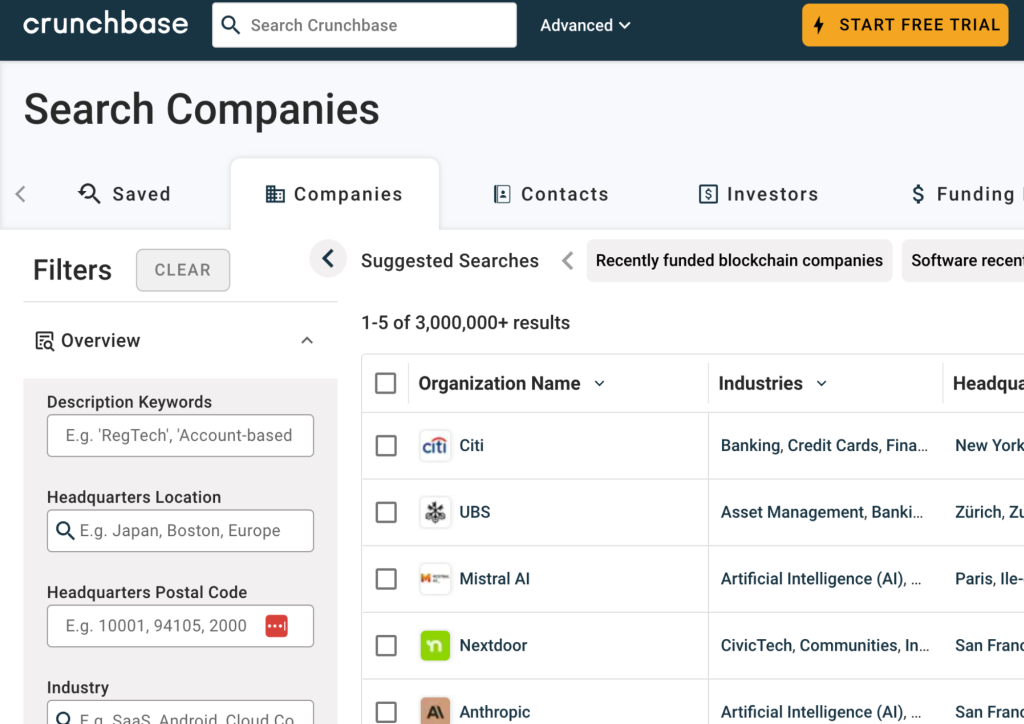
Overview
G2 Market Intelligence is a tool that provides businesses with insights into software and technology markets. Leveraging user reviews, ratings, and feedback, it helps organizations identify top-performing tools, understand market trends, and benchmark their performance. G2’s vast database of software reviews makes it particularly valuable for companies seeking reliable recommendations or competitive analysis.
Key Features
- Software Comparison Tools: Compare software solutions based on user reviews, ratings, and detailed feature analysis.
- Market Trend Insights: Analyze the latest trends in technology and software adoption across industries.
- Customer Sentiment Analysis: Understand user opinions and satisfaction with various tools and vendors.
- Competitive Intelligence: Benchmark your product’s performance against competitors using G2’s proprietary scoring system.
Advantages
- Crowdsourced Data: Relies on real user feedback, providing authentic and transparent insights.
- Extensive Database: Covers a broad range of industries and software categories.
- Actionable Insights: Combines user reviews with data-driven reports for informed decision-making.
- Vendor Support: Offers features for software vendors to manage reviews and enhance their market presence.
Disadvantages
- Focus on Software: Primarily benefits businesses in the software and tech sectors, limiting its relevance for other industries.
- Subscription Costs: Premium features and vendor tools may require a substantial investment.
- Potential Bias: Reviews may sometimes reflect individual biases or limited experiences, requiring careful interpretation.
Pricing
G2 offers free access to its database for basic research and software comparisons. For advanced features, including detailed competitive insights and vendor tools, custom pricing is provided based on the scope and scale of usage. Interested users can contact G2 for tailored solutions.
8. Klue
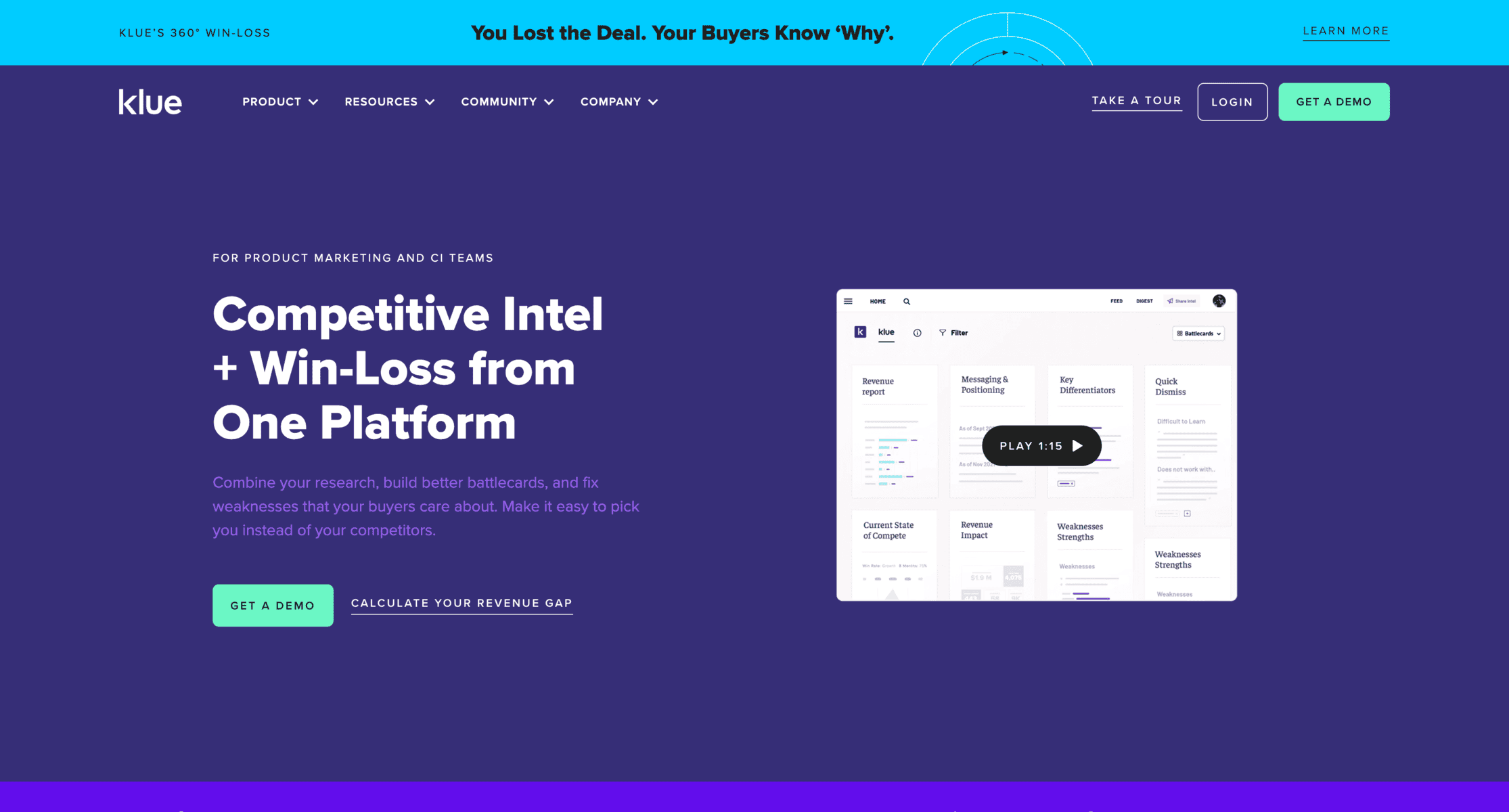
Overview
Klue is a marketing intelligence platform designed to help businesses track and analyze competitor activities. It focuses on providing sales enablement teams with actionable insights, enabling them to create winning strategies and effectively respond to market changes. Klue’s competitive intelligence capabilities make it a go-to tool for organizations aiming to outpace their competition.
Key Features
- Competitor Content Tracking: Monitors updates to competitor websites, product launches, and marketing campaigns.
- Battlecards for Sales: Provides easy-to-use templates to arm sales teams with quick access to competitor information.
- Collaboration Tools: Allows teams to collaborate on insights and share findings across departments.
- Custom Alerts and Reports: Sends real-time notifications on significant competitor movements.
Advantages
- Focus on Sales Enablement: Tailored tools help sales teams craft effective pitches against competitors.
- Customizable Insights: Businesses can prioritize tracking based on specific competitors or product lines.
- Collaborative Features: Encourages cross-departmental collaboration for a unified strategy.
- Ease of Use: Intuitive design simplifies access to critical data and insights.
Disadvantages
- Limited Broader Market Insights: Primarily focuses on competitor tracking, with less emphasis on industry trends or customer analysis.
- Premium Pricing: Cost may be prohibitive for smaller organizations.
- Setup Requirements: Requires time and effort to configure tracking preferences for maximum efficiency.
Pricing
Klue does not publicly disclose its pricing. The platform offers custom plans tailored to the size and needs of your business. Prospective users can request a demo to explore Klue’s features and discuss pricing options with their sales team.
9. TrustRadius for Vendors
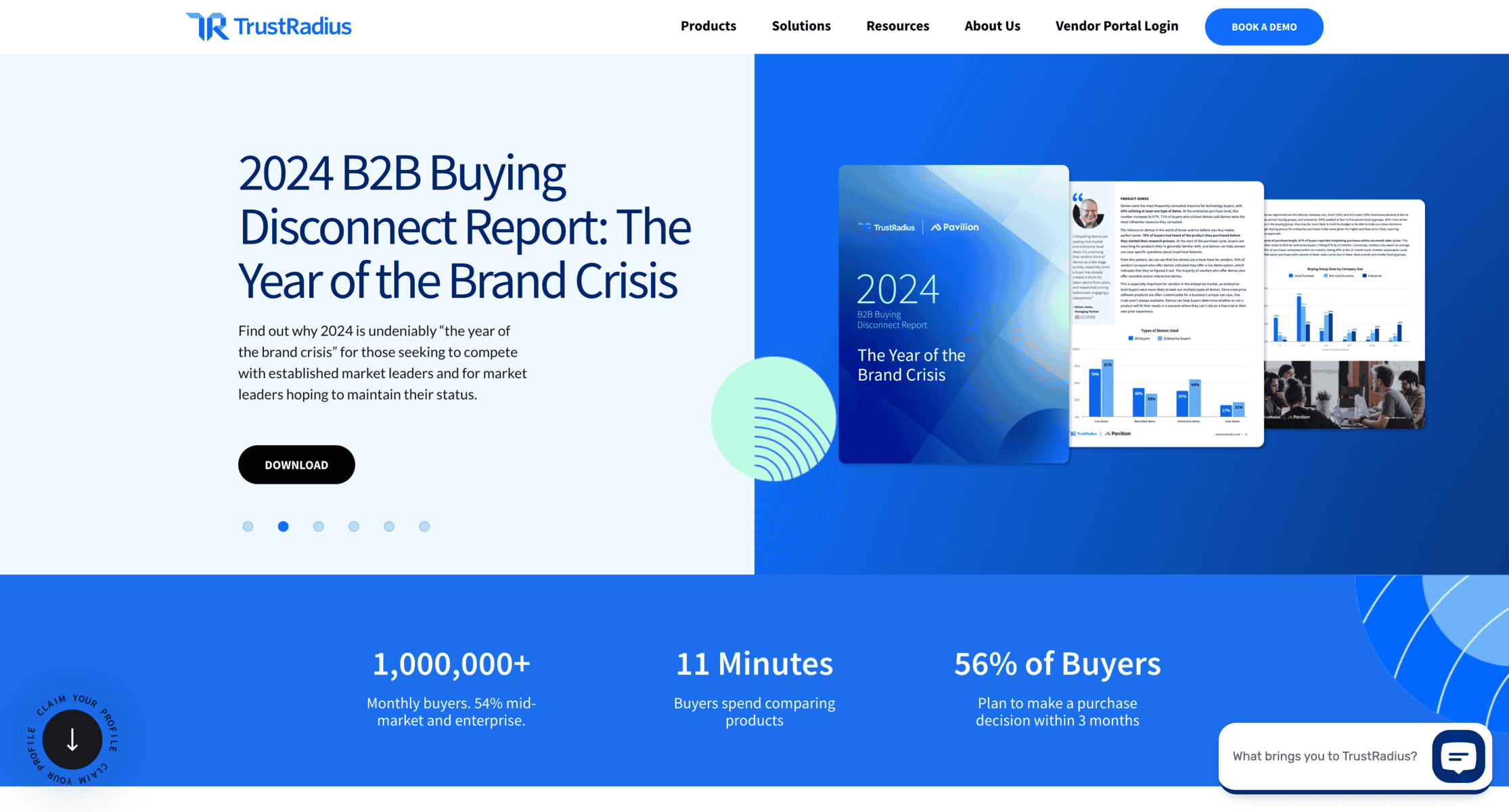
Overview
TrustRadius for Vendors is a platform that enables businesses to collect, showcase, and leverage customer reviews to build trust and credibility in the market. Designed for B2B companies, it helps vendors gather authentic customer feedback, analyze user sentiment, and use reviews as a tool for improving sales and marketing efforts.
Key Features
- Review Collection and Management: Encourages customers to leave detailed reviews and provides tools to manage and display them.
- Buyer Insights: Analyzes customer feedback to identify pain points and areas for improvement.
- Content Syndication: Allows reviews to be shared across various channels, enhancing marketing campaigns.
- Custom Reports: Provides analytics on review performance and customer sentiment trends.
Advantages
- Builds Credibility: Verified reviews help establish trust among potential customers.
- Improved Decision-Making: Feedback data provides actionable insights for product and service refinement.
- Enhanced Lead Generation: Reviews act as social proof, driving interest and conversions.
- Wide Reach: Syndication features amplify the visibility of customer reviews.
Disadvantages
- Subscription Cost: Premium features may be expensive for smaller businesses.
- Time-Intensive Setup: Collecting meaningful reviews can take time and effort.
- Dependence on Customer Willingness: Success depends on customer participation in providing feedback.
Pricing
TrustRadius for Vendors offers custom pricing plans tailored to business needs. Interested companies can request a demo to explore features and discuss pricing options with the TrustRadius team.
10. Factiva
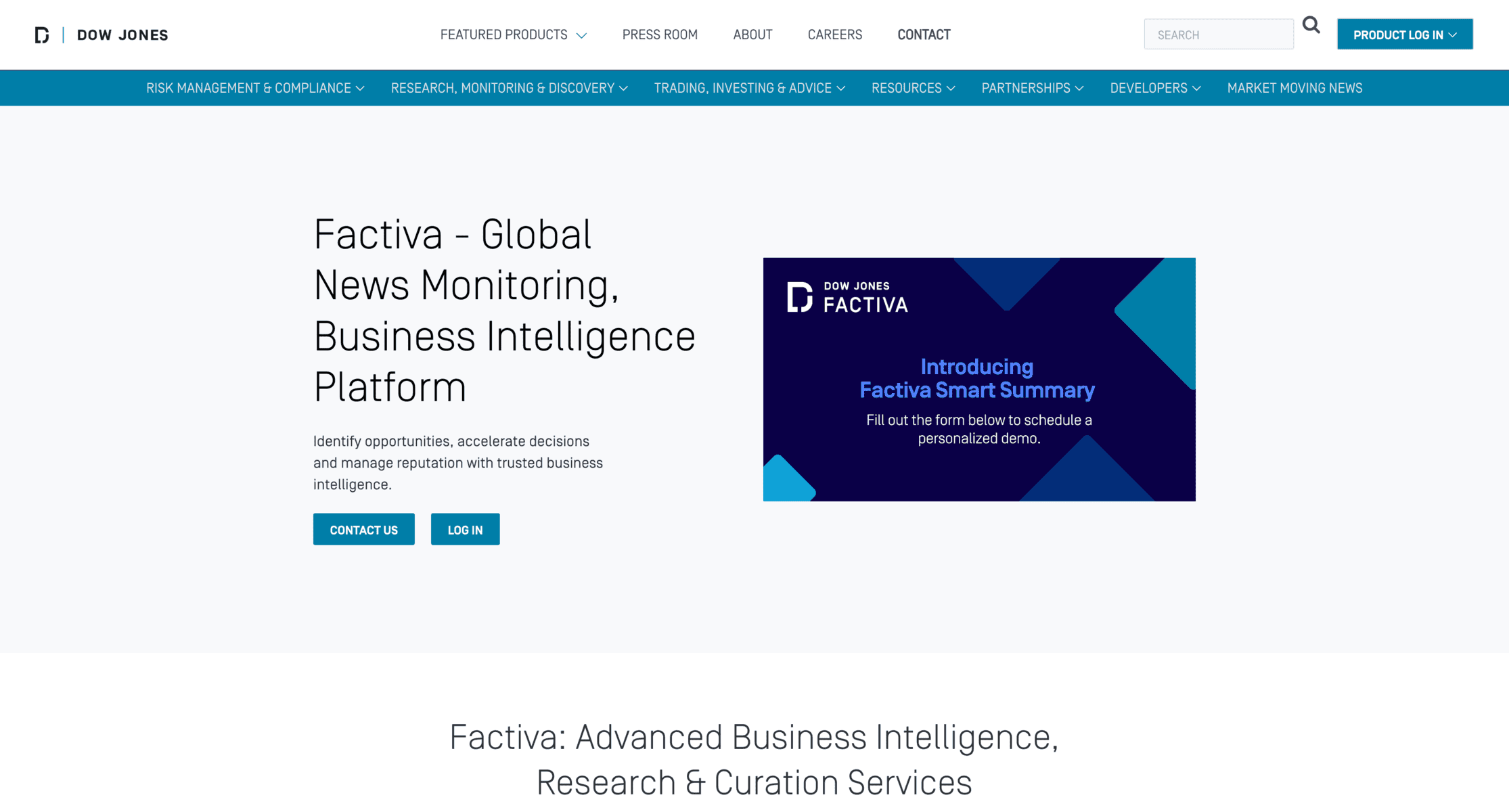
Overview
Factiva, a Dow Jones company, is a premium business intelligence tool offering access to a vast repository of news articles, industry reports, and global market data. It is ideal for businesses that need in-depth insights into market trends, competitors, and emerging opportunities.
Key Features
- Global News Database: Access millions of articles from top publications, including The Wall Street Journal and Reuters.
- Custom Alerts: Set up notifications for specific industries, companies, or keywords.
- Market Trends Analysis: Leverages news and data to identify emerging trends and opportunities.
- Comprehensive Search Tools: Advanced search options allow users to filter results by region, topic, or publication.
Advantages
- Wide Data Coverage: Offers access to a vast and diverse range of reliable sources.
- Real-Time Updates: Ensures businesses stay informed of the latest developments.
- Actionable Insights: Helps identify opportunities and risks with industry-specific analysis.
- User-Friendly Tools: Simplifies navigation and data retrieval.
Disadvantages
- High Cost: Pricing can be steep, making it less accessible for smaller businesses.
- Complexity for Beginners: The range of features may overwhelm new users.
- Focus on News: Primarily centered on news data, with fewer tools for customer or internal analytics.
Pricing
Factiva’s pricing is based on subscription plans tailored to business needs. Costs vary depending on the size of the organization and the level of access required. Prospective users can request a demo or consult the Factiva team for more information.
11. Leadspace
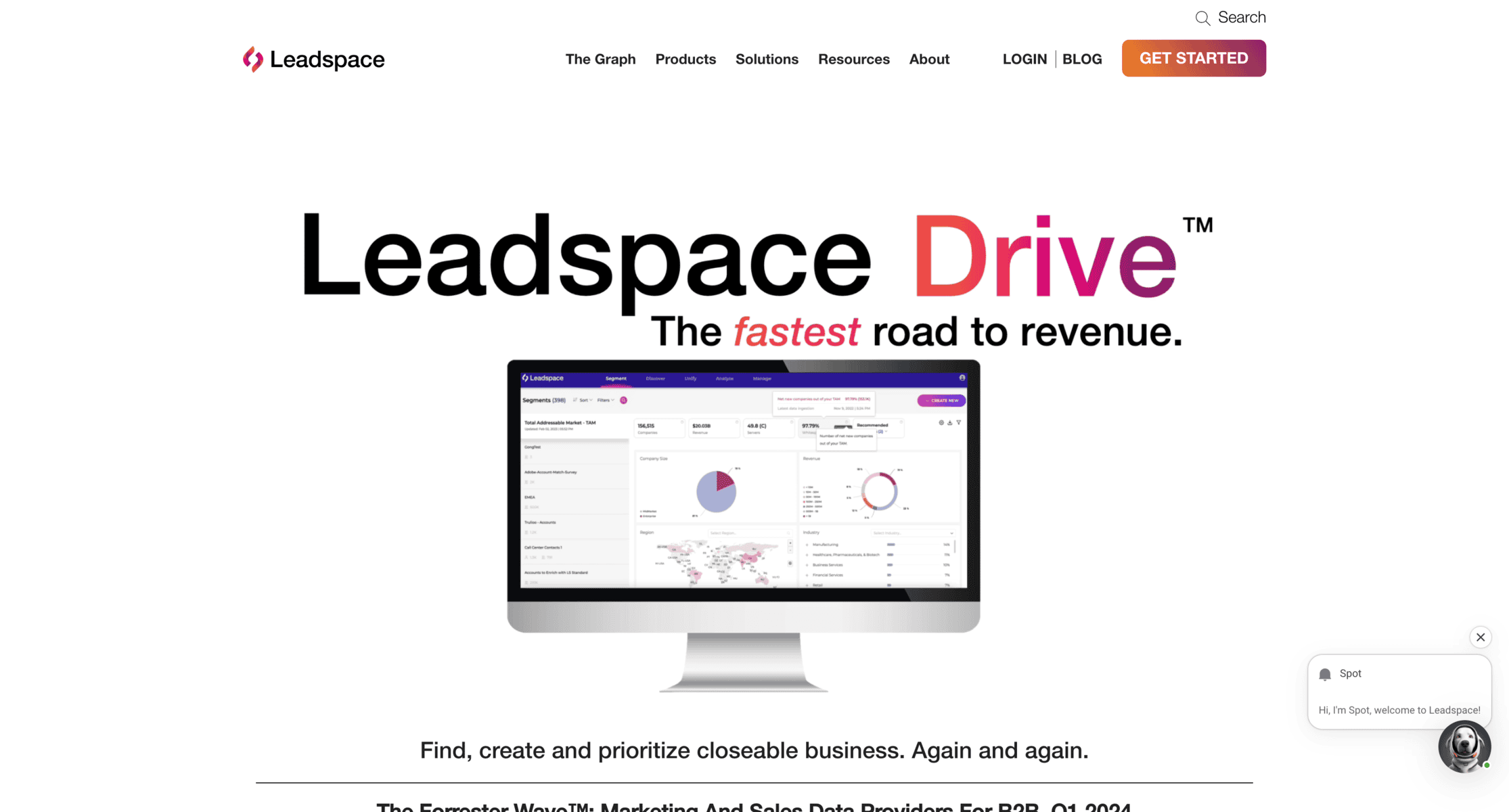
Overview
Leadspace is a marketing intelligence platform designed for B2B companies, focusing on data enrichment and customer profiling. It uses artificial intelligence to identify, segment, and target the most relevant audiences, helping businesses improve their sales and marketing effectiveness. Leadspace’s tools integrate seamlessly with CRM and marketing automation platforms, making it a versatile choice for data-driven teams.
Key Features
- Data Enrichment: Enhances customer and prospect data with additional details like firmographics and intent signals.
- Audience Segmentation: Helps businesses create accurate and dynamic customer segments for targeted campaigns.
- Lead Scoring: Uses AI to prioritize leads based on their likelihood to convert.
- CRM and MAP Integration: Syncs with popular tools like Salesforce, Marketo, and HubSpot for streamlined workflows.
Advantages
- AI-Driven Insights: Uses advanced analytics to provide accurate customer and market insights.
- Improved Targeting: Helps businesses focus on high-value prospects, improving conversion rates.
- Time Savings: Automates data enrichment and segmentation, reducing manual effort.
- Scalable Solution: Suitable for businesses of all sizes, with customizable options.
Disadvantages
- Steep Learning Curve: Advanced features may require initial training for effective use.
- Data Accuracy Concerns: Some users report occasional discrepancies in enriched data.
- Pricing: Custom pricing may be cost-prohibitive for smaller businesses.
Pricing
Leadspace offers custom pricing based on business needs and scale. Interested companies can contact the Leadspace team for a personalized demo and pricing details.
12. PitchBook
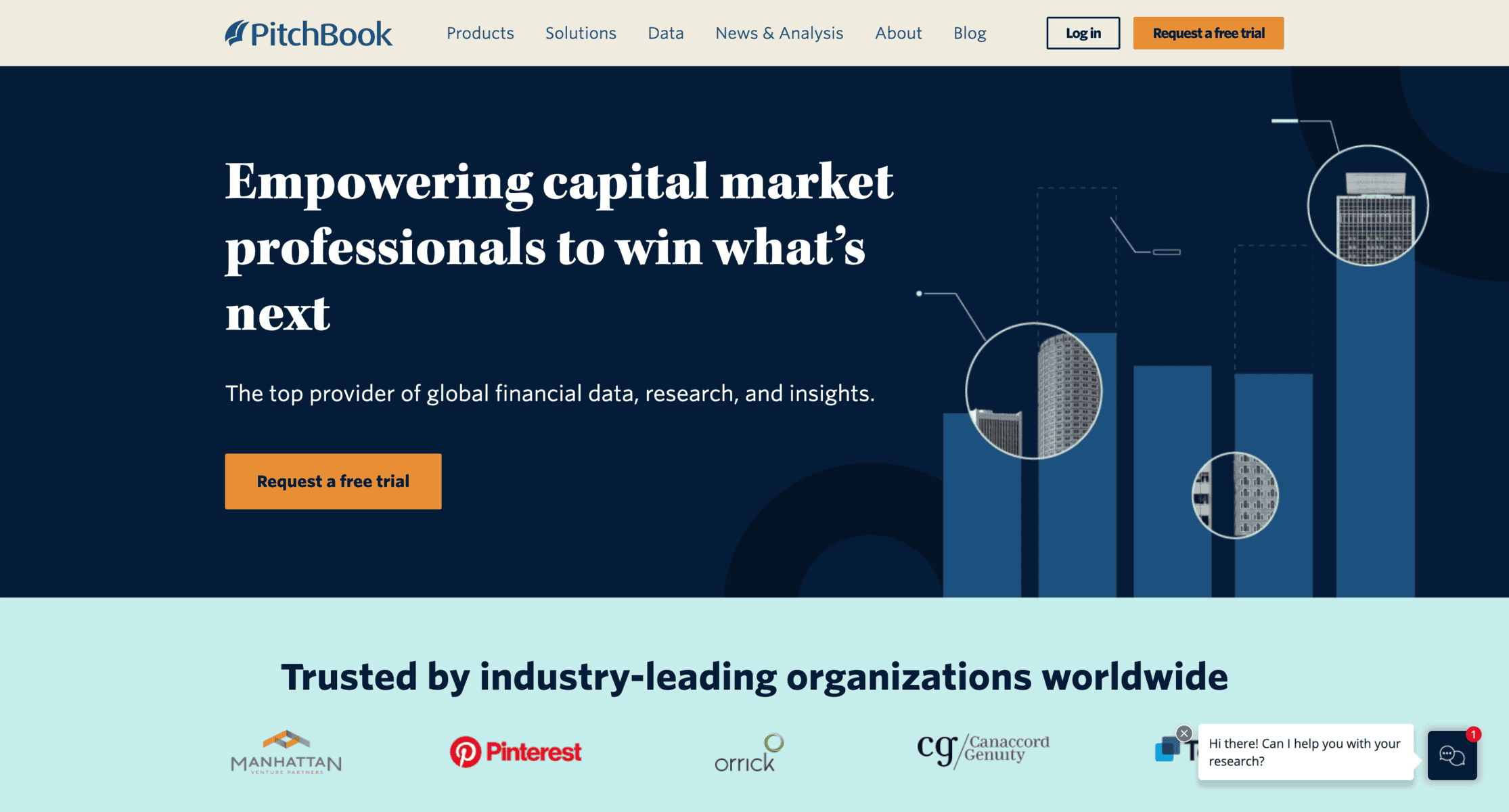
Overview
PitchBook is a financial data and analytics platform focusing on private equity, venture capital, and mergers and acquisitions (M&A). It provides in-depth data on companies, investors, and deals, making it a vital tool for investors, financial analysts, and business leaders aiming to track market opportunities and trends.
Key Features
- Company and Investor Profiles: Detailed profiles of companies, funds, and investors, including financial metrics and investment history.
- Deal Tracking: Monitors M&A activity, venture funding, and private equity transactions.
- Market Analysis: Offers insights into industry trends and performance benchmarks.
- Customizable Reports: Allows users to generate tailored reports based on specific criteria.
Advantages
- Comprehensive Financial Data: Provides reliable information on private and public markets.
- Actionable Insights: Helps businesses identify potential investment opportunities and risks.
- User-Friendly Interface: Simplifies data navigation and analysis.
- Industry Relevance: Tailored specifically for finance and investment professionals.
Disadvantages
- High Cost: Pricing may be inaccessible for smaller businesses or startups.
- Limited Use Outside Finance: Primarily focused on financial markets, with fewer applications for general market intelligence.
- Complex Features: Advanced analytics may require significant expertise to use effectively.
Pricing
PitchBook offers subscription plans tailored to the size and needs of businesses. Costs are typically high, reflecting its specialized nature, with custom pricing provided upon request. Prospective users can schedule a demo to explore its features and discuss pricing with the PitchBook team.
12. D&B Hoovers
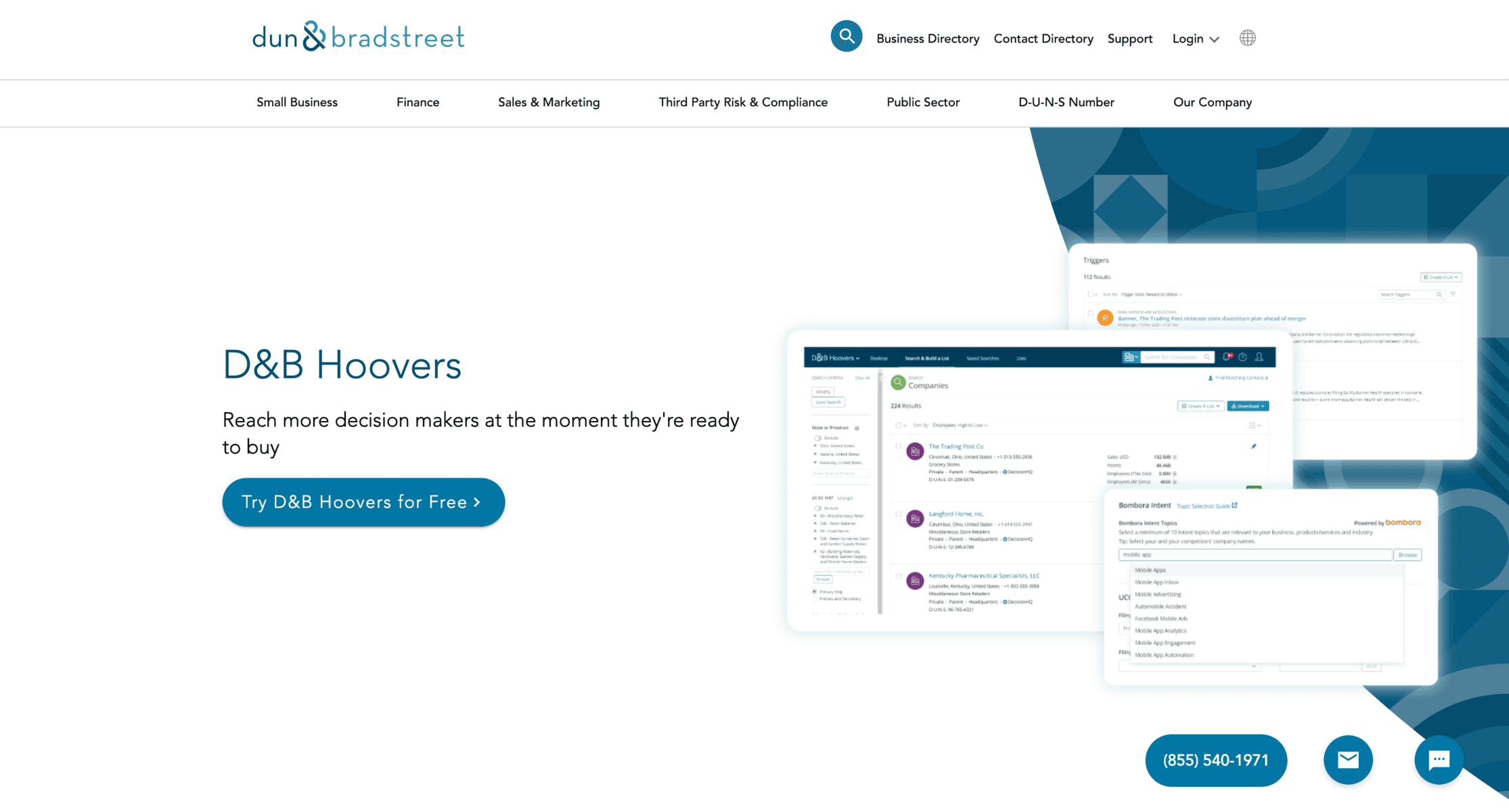
Overview
D&B Hoovers, powered by Dun & Bradstreet, is a business intelligence platform that provides access to a massive database of company information and market insights. It is designed to help sales and marketing teams identify leads, research prospects, and gain competitive insights. With its robust data enrichment capabilities, D&B Hoovers is particularly effective for B2B businesses looking to streamline their sales efforts.
Key Features
- Global Business Database: Access to information on millions of companies worldwide, including financials, leadership, and industry classifications.
- Lead Generation and Prospecting: Helps identify and prioritize high-value prospects based on company size, industry, and other criteria.
- Competitive Intelligence: Provides insights into competitor performance and market positioning.
- CRM Integration: Seamlessly integrates with platforms like Salesforce for efficient data management.
Advantages
- Comprehensive Coverage: Offers detailed and reliable data on a wide range of companies.
- Actionable Insights: Enables businesses to develop targeted strategies with enriched data.
- Streamlined Workflows: Integration with CRMs reduces manual data entry and improves efficiency.
- Customizable Reports: Allows users to generate reports tailored to specific business goals.
Disadvantages
- Pricing: Costs can be high, especially for small businesses or startups.
- Complexity for Beginners: The range of features may require training to fully utilize.
- Data Updates: Some users report occasional delays in updating company information.
Pricing
D&B Hoovers offers customized pricing plans based on the scope of use and features required. Smaller businesses can access basic packages, while enterprises can opt for advanced solutions with broader data access. Interested users can request a demo to understand the platform’s capabilities and pricing structure.
Picking Your Marketing Intelligence Tool Without Losing Your Mind 🤯
Choosing a marketing intel tool is like online dating—swipe left on the wrong one, and you’ll end up with a $10k/year mistake. Here’s how to avoid tool-induced regret:
Step 1: Diagnose Your Business OCD 🧠
Ask yourself:
- What’s Your Obsession? – Stalking competitors? – Reading customers’ minds? – SEO wizardry? – Lead gen that doesn’t suck?
- Team Size Drama: – Solo? Grab a tool that won’t make you cry (looking at you, HubSpot). – Enterprise? You need the Death Star of tools (hi, Salesforce).
- Industry Vibe Check: – SaaS? Try Pendo. – E-commerce? SEMrush’s your BFF. – Selling artisanal dirt? Godspeed.
- Budget Feels: – Broke? Free trials are your oxygen. – Ballin’? Go nuts with enterprise plans.
Step 2: The “Will This Tool Ruin My Life?” Checklist 🚨
Trust But Verify (Because Karen Lies)
Data accuracy is like your ex’s Instagram—looks perfect, but is it real? Use tools like G2 reviews to fact-check. Pro tip: If 80% of reviews say “meh,” run. Fast.
Plays Nice With Others 🧩
Your tool should jive with your CRM like peanut butter and rage. Test integrations with: – Zapier (duct tape for apps) – Your crusty old Excel sheets (RIP)
UX: Not a NASA Dashboard 🚀
If your team needs a PhD to use it, abort. Look for: – One-click reports – Drag-and-drop chaos – 24/7 support (because breakdowns happen at 2 AM) Tools like Hotjar nail this.
Price Tag Roulette 💸
Avoid tools that cost more than your coffee addiction. Rule of thumb: – Startups: <$100/month (try Google Analytics—it’s free, folks) – Mid-size: $100-$500 (SEMrush, we see you) – Enterprises: “Call for pricing” (translation: sell a kidney)
Frequently Asked Questions (FAQs) About Marketing Intelligence Tools
Q1: What is a marketing intelligence tool?
A marketing intelligence tool helps businesses gather, analyze, and leverage data about competitors, customers, and market trends to make informed decisions and improve their marketing strategies. These tools often provide insights into SEO performance, social media activity, competitor strategies, and customer behavior.
Q2: How do marketing intelligence tools differ from business intelligence tools?
While business intelligence tools focus on internal data such as sales, finances, and operational metrics, marketing intelligence tools focus on external data, including market trends, competitor activities, customer insights, and industry benchmarks.
Q3: Why should my business invest in a marketing intelligence tool?
Investing in a marketing intelligence tool can help you:
- Stay ahead of competitors.
- Identify market opportunities.
- Improve customer targeting and personalization.
- Optimize your marketing campaigns with data-driven insights.
Q4: How do I choose the best marketing intelligence tool for my business?
Consider these factors:
- Features: Ensure the tool meets your specific needs (e.g., competitor monitoring, SEO analysis, or social media tracking).
- Integration: Check if it integrates with your existing systems (e.g., CRM or analytics platforms).
- Usability: Choose a tool that is easy to use and provides adequate support.
- Budget: Look for a solution that fits within your budget while offering scalability.
Q5: What are some key features to look for in a marketing intelligence tool?
Key features include:
- Competitor analysis and monitoring.
- Market trend analysis.
- Customer behavior insights.
- Social media and content tracking.
- SEO and keyword performance metrics.
- Customizable dashboards and reporting tools.
